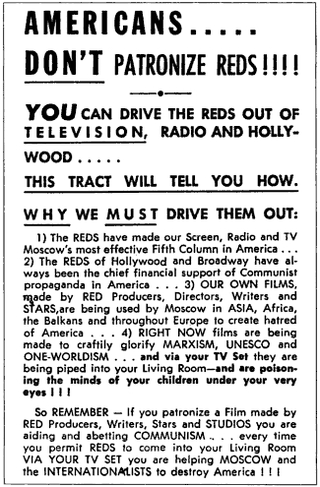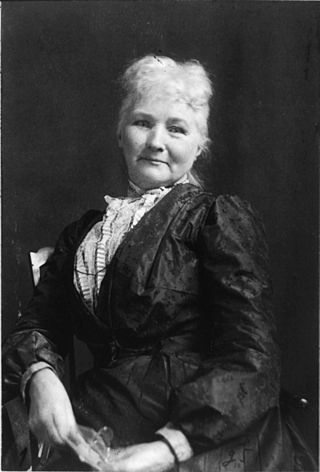Related Research Articles

The Industrial Workers of the World (IWW), whose members are nicknamed "Wobblies", is an international labor union founded in Chicago in 1905. The nickname's origin is uncertain. Its ideology combines general unionism with industrial unionism, as it is a general union, subdivided between the various industries which employ its members. The philosophy and tactics of the IWW are described as "revolutionary industrial unionism", with ties to socialist, syndicalist, and anarchist labor movements.

McCarthyism, also known as the Second Red Scare, was the political repression and persecution of left-wing individuals and a campaign spreading fear of communist and Soviet influence on American institutions and of Soviet espionage in the United States during the late 1940s through the 1950s. After the mid-1950s, U.S. Senator Joseph McCarthy, who had spearheaded the campaign, gradually lost his public popularity and credibility after several of his accusations were found to be false. The U.S. Supreme Court under Chief Justice Earl Warren made a series of rulings on civil and political rights that overturned several key laws and legislative directives, and helped bring an end to the Second Red Scare. Historians have suggested since the 1980s that as McCarthy's involvement was less central than that of others, a different and more accurate term should be used instead that more accurately conveys the breadth of the phenomenon, and that the term McCarthyism is, in the modern day, outdated. Ellen Schrecker has suggested that Hooverism, after FBI Head J. Edgar Hoover, is more appropriate.

Theodore Herman Albert Dreiser was an American novelist and journalist of the naturalist school. His novels often featured main characters who succeeded at their objectives despite a lack of a firm moral code, and literary situations that more closely resemble studies of nature than tales of choice and agency. Dreiser's best known novels include Sister Carrie (1900) and An American Tragedy (1925).

Salt of the Earth is a 1954 American drama film written by Michael Wilson, directed by Herbert J. Biberman, and produced by Paul Jarrico. All had been blacklisted by the Hollywood establishment due to their alleged involvement in communist politics.

Mary G. Harris Jones, known as Mother Jones from 1897 onward, was an Irish-born American labor organizer, former schoolteacher, and dressmaker who became a prominent union organizer, community organizer, and activist. She helped coordinate major strikes, secure bans on child labor, and co-founded the Labor unionist trade union, the Industrial Workers of the World (IWW).
Red-baiting, also known as reductio ad Stalinum and red-tagging, is an intention to discredit the validity of a political opponent and the opponent's logical argument by accusing, denouncing, attacking, or persecuting the target individual or group as anarchist, communist, Marxist, socialist, Stalinist, or fellow travelers towards these ideologies. In the phrase, red refers to the color that traditionally symbolized left-wing politics worldwide since the 19th century, while baiting refers to persecution, torment, or harassment, as in baiting.
Americans for Democratic Action (ADA) is a liberal American political organization advocating progressive policies. ADA views itself as supporting social and economic justice through lobbying, grassroots organizing, research, and supporting progressive candidates.
The Communist Party USA, ideologically committed to foster a socialist revolution in the United States, played a significant role in defending the civil rights of African Americans during its most influential years of the 1930s and 1940s. In that period, the African-American population was still concentrated in the South, where it was largely disenfranchised, excluded from the political system, and oppressed under Jim Crow laws.

Elizabeth Gurley Flynn was an American labor leader, activist, and feminist who played a leading role in the Industrial Workers of the World (IWW). Flynn was a founding member of the American Civil Liberties Union and a visible proponent of women's rights, birth control, and women's suffrage. She joined the Communist Party USA in 1936 and late in life, in 1961, became its chairwoman. She died during a visit to the Soviet Union, where she was accorded a state funeral with processions in Red Square attended by over 25,000 people.

The Harlan County War, or Bloody Harlan, was a series of coal industry skirmishes, executions, bombings and strikes that took place in Harlan County, Kentucky, during the 1930s. The incidents involved coal miners and union organizers on one side and coal firms and law enforcement officials on the other. The Harlan County coal miners campaigned and fought to organize their workplaces and better their wages and working conditions. It was a nearly decade-long conflict, lasting from 1931 to 1939. Before its conclusion, an unknown number of miners, deputies and bosses would be killed, state and federal troops would occupy the county more than half a dozen times, two acclaimed folk singers would emerge, union membership would oscillate wildly and workers in the nation's most anti-labor coal county would ultimately be represented by a union.

Clinton Jencks was an American lifelong activist in labor and social justice causes, most famous for union organizing among New Mexico's miners, acting in the 1954 film Salt of the Earth, and enduring years of government prosecution for allegedly falsifying a Taft-Hartley non-communist affidavit.

The Battle of Blair Mountain was the largest labor uprising in United States history and is the largest armed uprising since the American Civil War. The conflict occurred in Logan County, West Virginia, as part of the Coal Wars, a series of early-20th-century labor disputes in Appalachia.
The Westmoreland County coal strike of 1910–1911, or the Westmoreland coal miners' strike, was a strike by coal miners represented by the United Mine Workers of America. The strike is also known as the Slovak Strike because about 70 percent of the miners were Slovak immigrants. It began in Westmoreland County, Pennsylvania, on March 9, 1910, and ended on July 1, 1911. At its height, the strike encompassed 65 mines and 15,000 coal miners. Sixteen people were killed during the strike, nearly all of them striking miners or members of their families. The strike ended in defeat for the union.

The Asturian miners' strike of 1934 was a major strike action undertaken by miners in Asturias against the new government which involved the CEDA, from October 4-19. The strike and subsequent demonstrations eventually developed into a violent revolutionary uprising in an attempt to overthrow the conservative regime. The revolutionaries took over Asturias by force, killing many of the province's police and religious leaders. Armed with dynamite, rifles, and machine guns, they destroyed religious buildings, such as churches and convents. The rebels officially declared a Proletarian Revolution and instituted a local government in the territory. The rebellion was crushed by the Spanish Navy and the Spanish Republican Army, the latter using mainly colonial troops from Spanish Morocco.

The Coal Wars were a series of armed labor conflicts in the United States, roughly between 1890 and 1930. Although they occurred mainly in the East, particularly in Appalachia, there was a significant amount of violence in Colorado after the turn of the century.

International Red Aid was an international social-service organization. MOPR was founded in 1922 by the Communist International to function as an "international political Red Cross", providing material and moral aid to radical "class-war" political prisoners around the world.
The International Labor Defense (ILD) (1925–1947) was a legal advocacy organization established in 1925 in the United States as the American section of the Comintern's International Red Aid network. The ILD defended Sacco and Vanzetti, was active in the anti-lynching, movements for civil rights, and prominently participated in the defense and legal appeals in the cause célèbre of the Scottsboro Boys in the early 1930s. Its work contributed to the appeal of the Communist Party among African Americans in the South. In addition to fundraising for defense and assisting in defense strategies, from January 1926 it published Labor Defender, a monthly illustrated magazine that achieved wide circulation. In 1946 the ILD was merged with the National Federation for Constitutional Liberties to form the Civil Rights Congress, which served as the new legal defense organization of the Communist Party USA. It intended to expand its appeal, especially to African Americans in the South. In several prominent cases in which blacks had been sentenced to death in the South, the CRC campaigned on behalf of black defendants. It had some conflict with former allies, such as the NAACP, and became increasingly isolated. Because of federal government pressure against organizations it considered subversive, such as the CRC, it became less useful in representing defendants in criminal justice cases. The CRC was dissolved in 1956. At the same time, in this period, black leaders were expanding the activities and reach of the Civil Rights Movement. In 1954, in a case managed by the NAACP, the US Supreme Court ruled in Brown v. Board of Education that segregation of public schools was unconstitutional.

McAlister Coleman was an American journalist, author, and political activist on behalf of socialism and organized labor. Coleman gained public notice as a leading leftist critic of the Lusk Committee of the New York State Legislature in 1920. He was subsequently a frequent candidate for public office on the ticket of the Socialist Party of America. Coleman is today best remembered as an early biographer of Eugene V. Debs as well as the author of a 1943 work of social history, Men and Coal.

Joseph Sidney Gelders was an American physicist who later became an antiracist, civil rights activist, labor organizer, and communist. In the mid-1930s, he served as the secretary and southern-U.S. representative of the National Committee for the Defense of Political Prisoners. In September 1936, Gelders was kidnapped, beaten, and nearly killed by members of the Ku Klux Klan for his civil rights and labor organizing activities. After his recovery, Gelders continued his activism and cofounded the Southern Conference for Human Welfare and the National Committee to Abolish the Poll Tax. He collaborated closely with other activists including Lucy Randolph Mason and Virginia Foster Durr. Internal injuries sustained during his kidnapping and assault led to Gelders' death on March 1, 1950.
References
- ↑ Wald, Alan (1987). The New York Intellectuals: The Rise and Decline of the Anti-Stalinist Left from the 1930s to the 1980s (illustrated ed.). UNC Press Books. p. 56. ISBN 9780807841693 . Retrieved 3 March 2015.
- 1 2 Duke, David (2015). Writers and Miners: Activism and Imagery in America. University Press of Kentucky. p. 29. ISBN 9780813148212 . Retrieved 3 March 2015.
- 1 2 3 Members of the National Committee for the Defense; John C. Hennen (2015). Harlan Miners Speak: Report on Terrorism in the Kentucky Coal Fields (revised ed.). University Press of Kentucky. p. 9. ISBN 9780813159843 . Retrieved 3 March 2015.
- ↑ Catherine Mary McLoughlin (15 Sep 2007). Martha Gellhorn: The War Writer in the Field and in the Text (illustrated ed.). Manchester University Press. p. 41. ISBN 9780719076367 . Retrieved 3 March 2015.
- ↑ Denning, Michael (1998). "1". The Cultural Front: The Laboring of American Culture in the Twentieth Century (illustrated, reprint ed.). Verso. p. 13. ISBN 9781859841709 . Retrieved 3 March 2015.
- ↑ Powers, Rachael; Poynton, Holly (eds.). To Kill A Mockingbird, The Text Guide. Coordination Group Publications Ltd. ISBN 978-1-84762-023-1.
Even though there was medical evidence that proved the women hadn't been raped, the all-white jury sentenced all the men except the youngest to death.
- ↑ M. Stanton Evans, Blacklisted by History: The Untold Story of Senator Joe McCarthy and His Fight Against America's Enemies (New York: Crown Forum, 2007) ISBN 978-1-4000-8105-9, pp. 55-60, notes).
- ↑ "Prelude to McCarthyism: The Making of a Blacklist". Prologue Magazine. Vol. 38, no. 3. Fall 2006. Retrieved 3 March 2015.